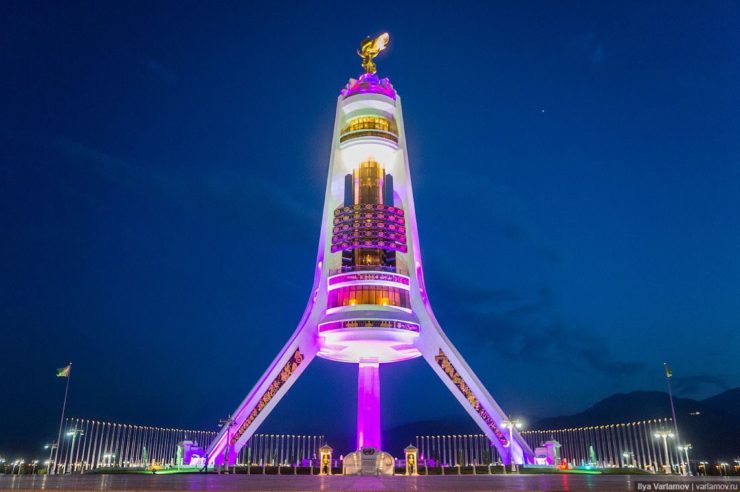
On December 12, 1995, the UN General Assembly adopted resolution No. 50/80 A “On the permanent neutrality of Turkmenistan,” thereby expressing broad approval by the international community of the young republic’s decision on its neutral status. All UN member states, without exception, supported this decision. Following the adoption of the resolution, Turkmenistan became the first country in history to consolidate its neutrality in the UN. Since that moment, December 12 has been a national holiday in Turkmenistan – the day of neutrality.
The theme of “positive neutrality” runs like a red thread through the entire history of modern Turkmenistan’s foreign policy. In particular, the country’s first long-term foreign policy document, adopted in 1995, was titled the “Foreign Policy Program of Turkmenistan as a Neutral state.”
Turkmenistan first declared its commitment to “positive neutrality” in 1992 at the summit of the Conference on Security and Cooperation in Europe, held in Helsinki. Nevertheless, it was 1995 that drew a line under the process of approving the permanent neutrality of the Republic, when it was supported at the summit of the Economic Cooperation Organization, at the meeting of heads of State and Government of the member countries of the Non-Aligned Movement, as well as, as already mentioned, by the UN General Assembly.
To understand the reasons that motivated Turkmenistan’s “permanent neutrality,” it is necessary to turn to the peculiarities of the international political situation in Central Asia – in the immediate geographical environment of the republic. These include: the presence of intense civil confrontation in Afghanistan and Tajikistan, in which a number of other countries of the region took part to varying degrees; the “power vacuum” in the region after the collapse of the Soviet Union; and the aggravation of a number of territorial disputes between newly formed states due to the mismatch of new political and old ethnic borders.
At the same time, it is necessary to take into account the high interest of Turkmenistan as a new (in the 1990s) state in gaining wide international recognition, as well as in building partnerships with wide circles of the international community. To achieve this task, the country chose to intensify its participation in international organizations, in particular, in the Non-Aligned Movement and the United Nations, an important point of interaction with which was the promotion of permanent neutrality and Turkmenistan’s participation in negotiation processes under the auspices of the United Nations, aimed at overcoming civil and international conflicts in the region. At the same time, the UN was considered in Turkmenistan as an important partner in case of a direct political threat to the republic due to instability in neighboring Afghanistan.
Probably, one of the functions of “positive neutrality” from the very beginning was to ensure moderate distancing of Turkmenistan from integration processes in the post-Soviet space – the republic was afraid of increasing influence on its policy by other major gas exporters, in particular the Russian Federation, which could limit its export opportunities. At the same time, the CIS markets did not seem promising for Turkmenistan’s gas exports, which also explains the tactics of avoiding participation in post-Soviet political and economic structures.
Yet in the early 1990s Turkmenistan could not have received significant benefits from cooperation with various participants in the conflicts that broke out in the region: the country had no territorial claims against its neighbors. From the very beginning, the country’s key foreign policy task was to ensure the export of Turkmenistan’s most valuable natural resource, on which its well-being still depends – natural gas. The key to a successful development of gas exports could only be peace, stability and security in Central Asia, without which any international transit routes of gas pipelines would be impossible. Meanwhile, in order to supply gas to the largest possible number of states, the importance for Turkmenistan of developing constructive and friendly relations with the maximum number of potential importing and transit states increased. All this could seemingly be ensured through permanent neutrality. Thus, the mono-sectoral export development model, rare for Central Asia in the 1990s, also largely predetermined the country’s choice in favor of “positive neutrality.”
Of course, there are much more extraordinary concepts that explain the popularity of the idea of neutrality in the independent Turkmenistan. In particular, a number of Turkmen experts discover the roots of the “strive for neutrality” in the very history of proto-states perceived by many as precursors of the modern republic. Regardless of the hierarchy of significance and relevance of the reasons for the emergence of such a phenomenon as Turkmenistan’s neutrality, it is still (and probably will be for a long time) a key tool in Turkmenistan’s foreign policy, as well as in its trade, narrow assortment-wise but reasonably large in terms of absolute numbers.
Boris Kushkhov, the Department for Korea and Mongolia at the Institute of Oriental Studies of the Russian Academy of Sciences, exclusively for the online magazine “New Eastern Outlook”.